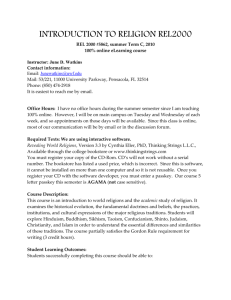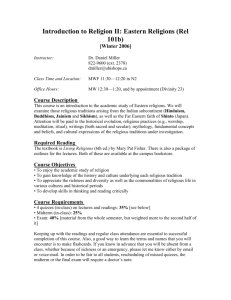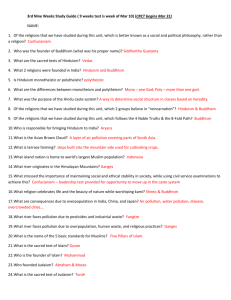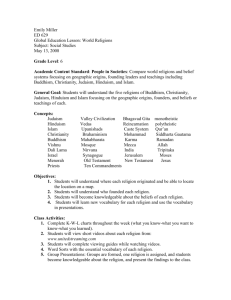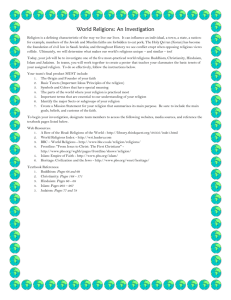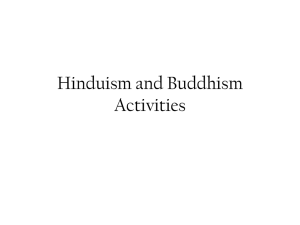Introduction to Religion REL 2000#5822, summer, 2009 100
advertisement
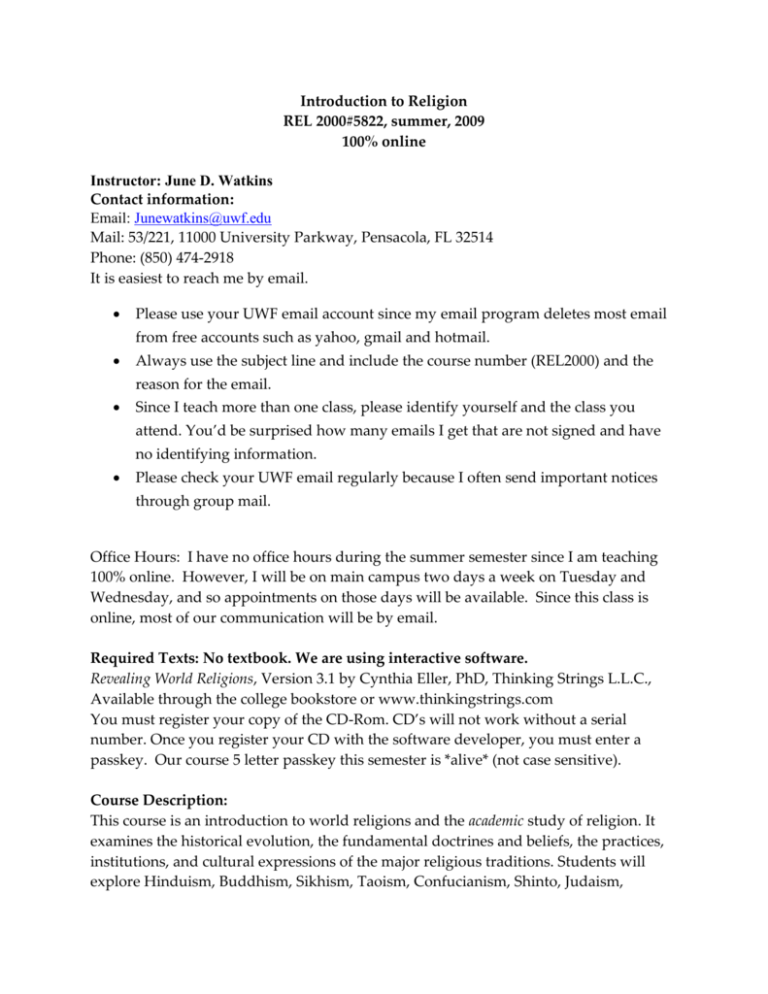
Introduction to Religion REL 2000#5822, summer, 2009 100% online Instructor: June D. Watkins Contact information: Email: Junewatkins@uwf.edu Mail: 53/221, 11000 University Parkway, Pensacola, FL 32514 Phone: (850) 474-2918 It is easiest to reach me by email. Please use your UWF email account since my email program deletes most email from free accounts such as yahoo, gmail and hotmail. Always use the subject line and include the course number (REL2000) and the reason for the email. Since I teach more than one class, please identify yourself and the class you attend. You’d be surprised how many emails I get that are not signed and have no identifying information. Please check your UWF email regularly because I often send important notices through group mail. Office Hours: I have no office hours during the summer semester since I am teaching 100% online. However, I will be on main campus two days a week on Tuesday and Wednesday, and so appointments on those days will be available. Since this class is online, most of our communication will be by email. Required Texts: No textbook. We are using interactive software. Revealing World Religions, Version 3.1 by Cynthia Eller, PhD, Thinking Strings L.L.C., Available through the college bookstore or www.thinkingstrings.com You must register your copy of the CD-Rom. CD’s will not work without a serial number. Once you register your CD with the software developer, you must enter a passkey. Our course 5 letter passkey this semester is *alive* (not case sensitive). Course Description: This course is an introduction to world religions and the academic study of religion. It examines the historical evolution, the fundamental doctrines and beliefs, the practices, institutions, and cultural expressions of the major religious traditions. Students will explore Hinduism, Buddhism, Sikhism, Taoism, Confucianism, Shinto, Judaism, Christianity, and Islam in order to understand the essential differences and similarities of these traditions. The course partially satisfies the Gordon Rule requirement for writing (3 credit hours). Student Learning Outcomes: Students successfully completing this course should be able to: 1. Differentiate between the major world’s religions by acquiring a basic knowledge of their histories, sacred stories, founders, and worldviews. 2. Understand the historical context in which these worldviews emerged. 3. Recognize the methods that religious scholars use in the critical analysis of religious phenomena. 4. Refine communication skills and express ideas clearly and concisely. 5. Improve time/project management skills by preparing assignments and meeting deadlines. 6. Demonstrate proficiency in academic writing using Turabian and the Chicago Manual of Style. eLearning: Our class is 100% online. I recommend that you go through the Student Orientation Guide located on your “My Home” page of eLearning. If you encounter any technological problems any time during the semester, please contact ITS. There is a “request help from the ITS Help Desk” link located on your “My Home” page. There is a quick start guide available. Grading: 25% --participation on discussion boards and progress on the CD 25%—quizzes on individual religions 20%—religious autobiography 5%—abstract and bibliography 25%—final research paper Religious Autobiography: One of the first writing assignments in the course will be to write your own religious autobiography. Papers should be 2 or 3 pages long with an average size of 2 pages double spaced. There will be no citations (footnotes) required since this assignment is about you. All papers for this course should be double spaced using Times New Roman, 12 pt, and black font. Evaluation is based on content, form and style. Since this is your autobiographical sketch of your religious development/beliefs, there are no wrong answers. But you do need to prepare the paper in an interesting, professional and organized manner. Research Paper: The research paper will be independent research and analysis of a topic related to the academic study of religion. The topic must be relevant to our subject matter, and by that I mean the topic should address religion from an academic stand point and not from a religious stand point. We aren’t doing religion; we are researching and learning about religion. The finished paper should be 4-5 pages in length. A list of appropriate topics will be provided. You are not limited to the listed topics and may research a topic of your own, but only after approval from the instructor. Papers are evaluated on four criteria: (1) Style/Grammar; (2) Depth of analysis; (3) Logic and clarity of argument; (4) Research skills including footnotes and bibliography. Students should incorporate class materials into the research paper and demonstrate a clear understanding of the course readings. The grading rubric is located on the file called “Writing research papers in religious studies” located in the content section. Prior to turning in the finished research paper, a proposed outline of research plans and a proposed bibliography will be turned in, allowing me to give you some feedback and help. Participation: Each course develops its own “class culture” and so participation is vital to the success of the course. An “A” for participation in this class requires a minimum of 2 log-ins per week and active participation on the discussion boards. Active participation is defined as at least one original posting in the discussion section of the website each week as well as at least 1 response to another student’s comment or question. These discussion posts must be substantive and relevant. In other words, writing “I agree with Joe!” is not substantive. More about Respect: Unlike other disciplines, religious studies is unique in that students begin this class with deeply held convictions about (and often emotional attachments to) the subject matter. When studying mathematics, for example, it would be unusual for students to believe that an equilateral triangle is true but an isosceles triangle is false, and yet this is often the case with religious studies. This presents a challenge for students and so I ask you approach these new systems of thought with an open mind (or at least a neutral mind) in the hopes that by understanding another system of belief, you may find that you understand your own tradition a little better. No student is asked to compromise his or her own beliefs, and yet we must practice tolerance for beliefs other than our own. The academic study of religion is not about ranking religions from better to worse. Each system of belief is appreciated for its own contribution to the world. Grading Scale: Grade Description Range Grade Points A Outstanding 94-100 4.0 A- Outstanding 90-93 3.7 B+ Above average 87-89 3.3 B Above average 84-86 3.0 B- Above average 80-83 2.7 C+ Average 77-79 2.3 C Average 74-76 2.0 C- Average 70-73 1.7 D+ Below average 67-69 1.3 D Below average 64-66 1.0 F Failure 0-63 0.0 Student Code of Conduct The Student Code of Conduct sets forth the rules, regulations and expected behavior of students enrolled at the University of West Florida. Violations of any rules, regulations, or behavioral expectations may result in a charge of violating the Student Code of Conduct. It is the student’s responsibility to read the Student Code of Conduct and conduct him or herself accordingly. You may access the current Student Code of Conduct at http://www.uwf.edu/judicialaffairs. Plagiarism and Turnitin Notice: All written work that you turn in must be your own. Please make sure you understand the rules of plagiarism and that you have gone through the UWF Plagiarism Policy. The consequences for academic dishonesty are severe and anyone caught “cutting and pasting” or downloading other research papers or working together on quizzes will fail the course and will be referred to the Assistant Dean for further disciplinary action. Your research paper and midterm will be scanned by Turnitin software to evaluate it for originality. If you object to this, you have a right to notify me within one week from the first day of class to request that I use an alternative method of evaluating your paper. Suggestions for success: Keep track of the syllabus schedule. Make an appointment with yourself twice a week to work on this class. Be sure to keep up. It is very common in online classes for students with the best intentions to fall behind. Take notes on the modules, and jot down any questions you have and ask for help. Frame your comments and questions to classmates in respectful language. Be sure you have read and understood the UWF plagiarism policy. Plagiarism ranges from minor infractions such as mistaken footnotes all the way to more serious cases of downloading complete papers from the internet. There is a range of infractions in between. Make sure you are turning in work in your own words. 1 Module/Dates Topic /Sections on CD Assignments Orientation May 11-17 Intro/Syllabus Student intros Course overview Orientation Read UWF plagiarism policy or go through tutoring module at UWF library take Syllabus quiz 2 3 Exploring Religions May 18-24 Hinduism May 25-May 31 4 Buddhism June 1-7 5 Sikhism June 8-14 What is Religion? Types of Religions Studying Religion Defining &Finding Hinduism Birth of Hinduism Hinduism after Vedas Philosophy of Hinduism Yoga Schools of Hindu Philosophy The Hindu Pantheon Puja and Pilgrimage Hinduism in the West Life of the Buddha Philosophy of Buddhism First 400 years Theravada Buddhism Mahayana Buddhism Vajrayana Buddhism Mahayana in China Mahayana in Japan Buddhism in the West Emergence of Sikhism Life of Guru Nanak Sikh Theology The Ten Gurus The Khalsa Sikh Scripture Sikhism in India and Diaspora Rituals and Rites of Passage Sikh Holidays complete all sections in courseware complete all sections Hinduism quiz “My Religious Autobiography” due May 31 at 11:59 PM Complete all sections Buddhism quiz Complete all sections Sikhism quiz 6 Taoism June 15-21 7 Confucianism June 22-28 8 Shinto June 29-July 5 9 Judaism July 6-12 10 Christianity July 13-19 Ancient Chinese Religion Beginnings of Taoism Philosophy of the Tao Taoism as a Religion Taoist Pantheon Second Millennium CE Meditation & Medicine Taoist Ritual Practices Taoism in the Modern Era Life of Confucius Fundamentals Confucianism Confucian texts Early Confucian history The Modern Era Early Japanese Religion Shinto after Buddhism Key Characteristics Shinto Mythology Kami Shinto Shrines Shinto Worship Basic Principles Cultural Context Hebrew Scriptures Ancient History Jewish Diaspora Judaism in America The State of Israel Jewish Practice Jewish Holidays Jewish Rites of Passage Women in Judaism Jesus/Early Christianity Christian Scriptures After the Fall of Rome Medieval Christianity Protestant Reformation Christian Practices Christian Holidays Christianity in 21st century Complete all sections Taoism quiz Complete all sections Confucianism quiz Proposed Outline/Bibliography due June 28 11:59 PM Complete all sections Shinto quiz Complete all sections Judaism quiz Complete all sections Christianity quiz 11 Islam July 20-26 Life of Mohammad Islamic Texts Major Tenets of Islam Religious Practices History of Islam Complete first 5 sections Research Paper due July 26 at 11:59 PM 12 Islam July 27-Aug 2 Sufism Islamic Resurgence Islam around the World Women and Islam Complete these 4 sections Islam quiz 13 Religious Pluralism Aug 3-7 The World’s Religions New Religious Movements Religion in the 21st century Complete all sections Please note: All make-up work or late work must be completed and turned in no later than the last day of classes for the semester. Incomplete grades will convert to zeros at that time.
